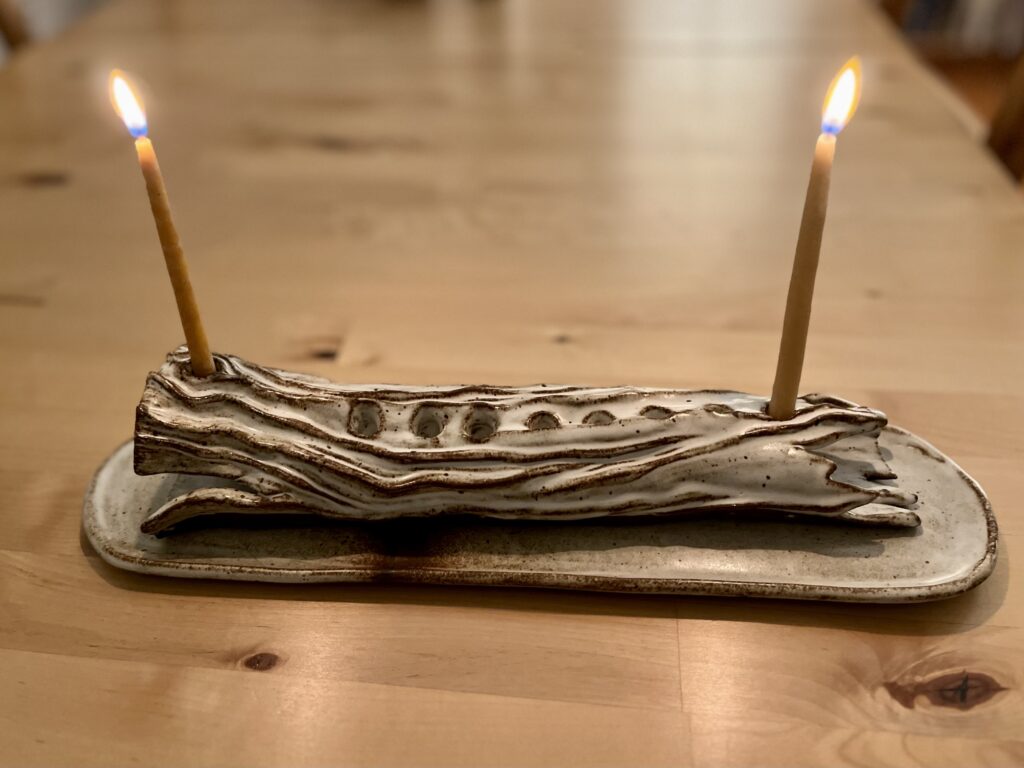

Ritual Can Help Us Find Meaning in Hard Times
On a recent Sunday, I found myself not knowing what to do next at that point in the day. Waves of worry and sadness at the news washed over me. While I often might be able to keep myself moving with the belief that my small piece of working towards a more just and liberated world is meaningful, in that moment that understanding felt so insufficient.
As I stood in the middle of my living room, I felt a paw at my ankle. My dog, at least, was clear on what we should do—go into the forest, as we do together whenever we have time and daylight.

What is ritual anyway?
In her book Inventing Jewish Ritual, Vanessa Ochs builds a definition of ritual through describing some of what ritual can offer us. According to Ochs,
rituals give us things to do and ways of being that help us to give sense and order to life…[they] create boundaries and necessary separations; create bonds and links between people that can transcend time and space; allow us to recognize, experience, and be sustained through life’s great joys and sorrows, and all the hard-to-categorize emotions in between; allow us to remember, to mark time, to synchronize our psyches with natural cycles…

Another framing appears in a parable from Rabbi Yechezkel Panet (a leading rabbi in 19th-century Romania, often referred to by the name of his collected works, the Mareh Yechezkel). He writes:
A king was traveling through the desert, and his son, the crown prince, thirsted for water. But instead of dispatching a horseman to fetch water from the nearest town, the king ordered a well to be dug at that very spot and marked with a signpost.
“At the present time,” explained the king to his son, “we have the means to obtain water far more quickly and easily. But perhaps one day, many years in the future, you will again be traveling this way. Perhaps you will be alone, without the power and privilege you now enjoy. Then the well we dug today will be here to quench your thirst. Even if the sands of time have filled it, you will be able to reopen it if you remember the spot and follow the signpost we have set.”
This is why, the parable concludes, we have rituals and sacred times in Judaism that bring out particular qualities.
Shabbat, for example, is associated with rest. That sacred rest calls back to both the completion of the original divine act of creating the universe and the liberation of the ancient Israelites from oppression. Shabbat can help us remember how vital rest is to our creative pursuits and that in order to pursue freedom and wellbeing for all people, we must build our own embodied knowledge of what it means to be free and well.
Signposts towards meaning and connection
Just as Shabbat is equally there for us when rest feels welcome and when it feels difficult to slow down and pause withwhat is, our joyful practices of celebrating life cycle moments or holidays intuitively embody the energy of celebration.
In times of grief or struggle, however, these practices become almost a dare, a countercultural task of imagination, letting us strengthen our muscle memory for what might be possible. If we build our ritual practices, both within and beyond Judaism, on the days where it feels easy, then those practices will be there to support and sustain us on challenging days, just like the wells in the parable.
Some big Jewish questions
Whether you, like me, encountered traditional Jewish practices as an adult, whether you grew up with those practices, or whether you’re just now getting curious about them, I’m interested to know where practice and ritual fit into our lives.

When we inherit rituals that turn out not to be a good fit for our adult lives, where do we change the form of the ritual itself, and where do we imbue old forms with new meaning? And particularly in times as turbulent and challenging as the ones in which we live, how can rituals, both secular and Jewish, support us? How can we build ritual practices that feel responsive and sustaining, increasing our resilience and connectedness?
Join us in learning and connection
If these are questions you’d like to spend time with, I invite you to join me for GatherBay’s upcoming cohort, Big Jewish Questions: Ritual Edition.

This will be an interactive experience of facilitated discussion, personal exploration, and connection among other young(ish) adults. If this sounds good to you, please fill out this brief application form. Applications are rolling until January 10, but we encourage you to apply early! We begin learning together on Wednesday, January 17, 2024.
Not sure if the cohort is right for you, or just want to have a chat about Jewishness and ritual? Let’s get coffee (our treat) in-person or virtually — find a time here.
*
Rabbi Gray Myrseth is GatherBay’s Community Rabbi. Originally from San Francisco, Gray was ordained at the Hebrew College Rabbinical School of Newton, MA, and has worked as a rabbi, chaplain, and educator with people of all ages, within Jewish institutions and beyond. When not at work, they can be found making ceramic Judaica, writing and reading poetry, expounding on the wonders of Talmud study, and enthusiastically exchanging podcast recommendations.